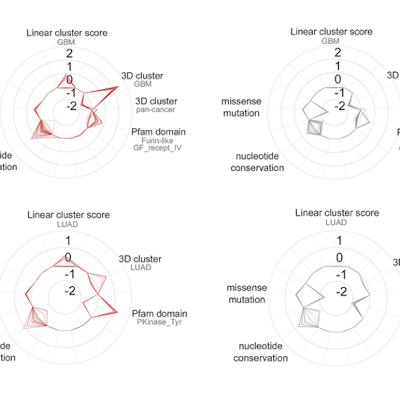September 20, 2021 -- Tumors have more genetic tricks for escaping detection by the immune system than previously thought, according to a new study published on September 17 in Science. The study results may inform the development of therapeutic strategies that can counter those tricks.
By probing the effects of 7,500 genes, including genes known to be involved in human cancer, scientists have discovered more than 100 mutated tumor suppressor genes: genes that regulate cells during cell division and replication. Importantly, researchers found that the mutated genes can prevent the immune system from spotting and destroying malignant cells in mouse models.
The new finding challenges the conventional narrative of cancer: that the majority of mutations in tumor suppressor genes cause cells to divide and grow uncontrollably. The results may also help explain why the immune system, which is normally highly proficient at attacking invaders, doesn't do more to fight early-stage tumors.
"The shock was that these genes are all about getting around the immune system, as opposed to simply saying 'grow, grow, grow!'" Stephen Elledge, PhD, a geneticist at Brigham and Women's Hospital, said in a statement. Elledge led a team composed of researchers from Brigham and Women's Hospital, Harvard Medical School, and the Dana-Farber Cancer Institute in Boston.
CRISPR-engineered mouse tumor cells
Elledge compiled a list of 7,500 known or putatively druggable cancer-linked mouse genes. His team then used CRISPR to engineer thousands of breast tumor cells, each of which lacked a functioning version of one of those genes. The cells were grown in vitro for 10 population doublings and inserted into two groups of mice: one with an immune system and one without.
By comparing how tumors developed in mice with an immune system versus immunodeficient mice, researchers believed it might be possible to identify which genes were required for tumor growth in the presence of an adaptive immune system.
In mice with immune systems, a particular set of defective tumor suppressor genes showed up frequently. Those genes, which accounted for 30% of the tumor suppressor genes tested, work by enabling tumors to evade detection by the immune system. In other words, these genes somehow prevent the immune system from spotting and destroying the malignant cells.
Potential new treatments
One gene in particular, G protein subunit alpha 13 (GNA13), appeared frequently in the normal mice, suggesting that mutation of GNA13 was helping to create a "safe space" for the tumor to thrive. Previous studies in human cancer patients had implicated loss of GNA13 function in a variety of cancers, including lymphomas, endometrial tumors, bladder tumors, and liver carcinomas.
Elledge's team was able to identify a specific mechanism triggered by loss of GNA13 function that helped protect cancer cells from the immune system's T cells, thereby creating a protumor microenvironment. Specifically, it turned out that loss of GNA13 led to an influx of myeloid cells, including tumor-associated macrophages (TAMs) into the tumor, and the secretion of the chemokine CCL2 (monocyte chemoattractant protein-1, or MCP-1).
TAMs had previously been shown to contribute to tumor progression, and the team's discovery that GNA13 loss enhances CCL2 secretion raises the possibility that patients with tumors deficient in GNA13 function may benefit from therapies that target TAMs and interfere with the section of CCL2.
In future work, it will be important to determine if tumor suppressor gene mutations "can serve as biomarkers for immune modulating therapies, like antibodies against CCL2 that may cooperate with immune checkpoint inhibitors," the study's authors noted.
Elledge suspects that many of the mutated genes use similar strategies. If further studies confirm this hunch, a technique that blocks one evasion method could potentially thwart others as well.
Finally, Elledge hopes his findings can spur new ways to treat cancer by making it possible to uncover and stymie the different tricks tumors use to avoid early detection by the immune system. "There are a lot of genes that people can now study," he said.
Do you have a unique perspective on your research related to cancer research? Contact the editor today to learn more.
Copyright © 2021 scienceboard.net







